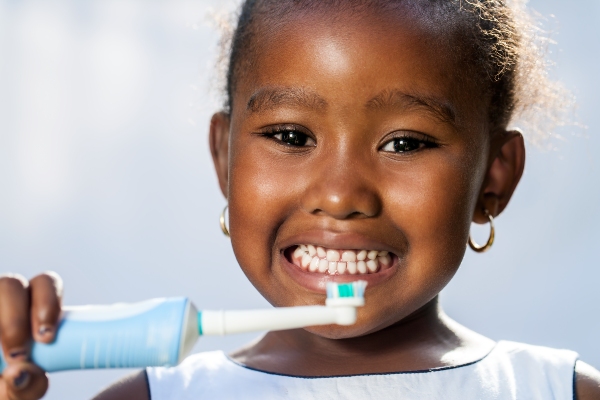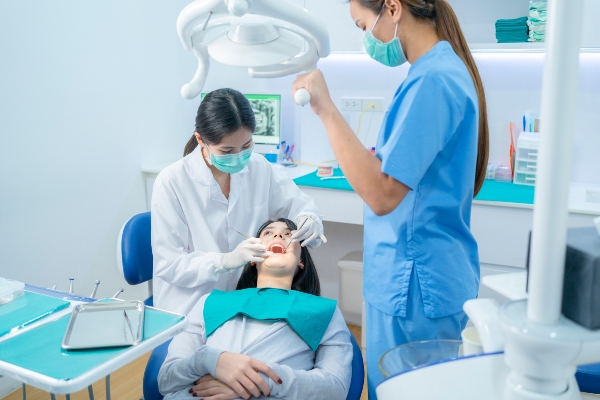 Oral hygiene basics are the foundation of a child’s oral health. This article will review how practicing oral hygiene basics will keep your child’s teeth healthy so they can serve them well for a lifetime.
Oral hygiene basics are the foundation of a child’s oral health. This article will review how practicing oral hygiene basics will keep your child’s teeth healthy so they can serve them well for a lifetime.
Understanding oral hygiene basics
Brushing
One of the most important aspects of dental hygiene is brushing regularly. Pediatric dentists will recommend brushing a minimum of twice daily. Children should make sure to reach the surfaces of each tooth, brush the tongue, and along the gum line. Dentists recommend brushing for about two minutes using gentle and circular back-and-forth motions. They also recommend waiting about 60 minutes after eating before brushing. Waiting gives saliva time to wash away enamel-weakening acid.
Many pediatric dentists may recommend fluoride toothpaste to add a layer of protection between appointments. Fluoride toothpaste has many flavor and texture options, making it easy for kids to choose one they like. Doing so will make brushing more enjoyable, making children more apt to do it regularly.
The toothbrush parents buy is just as important as their child’s toothpaste. The bristles should be soft whether a child uses a manual or electric brush. Parents should remind their children, regardless of age, to change their toothbrushes or brush heads every three months or sooner if the bristles are worn. The toothbrush should also be replaced if used when the child is ill.
If used properly, manual toothbrushes are effective. However, electric and battery-operated devices tend to remove more plaque. Some models have built-in timers and alert users who are brushing with too much force. More advanced electric toothbrushes use Bluetooth to record brushing patterns, time, and other data to help children improve their brushing technique.
Additional oral hygiene practices
Although brushing often gets the most attention, other oral hygiene basics are necessary and just as important for healthy teeth. Kids should never neglect the following three practices:
1. Flossing
Flossing removes food particles from between the teeth. This prevents bacteria from growing in interdental spaces, causing tooth decay and gum disease. When using traditional floss, hold about 18 inches of the thread. Wrap one end around each middle finger, guide the floss through each interdental space, and rub it up and down the side of each tooth.
Water picks, pre-threaded floss handles, and interdental brushes are for those who find traditional floss difficult to use or want a faster yet effective alternative.
2. Rinsing
Although mouthwash is not strictly necessary for a healthy mouth, rinsing can enhance one’s oral hygiene routine. Many rinses have fluoride or other beneficial ingredients. Rinses are not a replacement for brushing but can reach and disinfect places the child may have missed. Talking with a pediatric dentist can help parents choose which rinse will benefit their child the most, as all rinses have different purposes.
3. Visiting the dentist
Visiting the dentist for a cleaning and exam twice a year is one of the most important things parents can do for their children’s oral health. Dentists can catch minor problems before they become serious issues. If a child needs specialized toothpaste or mouthwash, a pediatric dentist can write a prescription or recommend an over-the-counter product.
Conclusion
A child’s teeth are one of their most valuable assets. Practicing good oral hygiene basics can help keep smiles beautiful and mouths healthy. If it is time for your child's next dental appointment or you have questions about improving their oral hygiene habits, call us today.
Request an appointment or call Hudson Valley Pediatric Dentistry at 845-363-4177 for an appointment in our Middletown office.
Recent Posts
Having a solid handle on oral hygiene basics will help preserve the integrity of a child's teeth and mouth health for many years to come. Steering clear of cavities, receding gums, or decay ensures their smile is bright and beautiful for as long as possible. If your child believes they already have an excellent oral…
When you and your child visit the dentist, you expect to get your child’s teeth cleaned and learn the current state of their dental health. However, many parents overlook the expertise dentists can provide about the important aspects of oral hygiene basics.In addition to caring for teeth, dentists can offer helpful recommendations for young patients…
In order to maintain your child's healthy teeth and gums, you should follow the oral hygiene basics recommended by a pediatric dentist. These practices, including brushing and flossing, should be done twice and once a day, respectively. However, it is common for children to forget to maintain these habits. Failing to observe oral hygiene basics…


